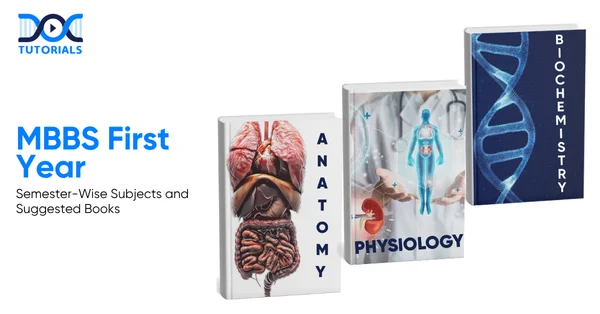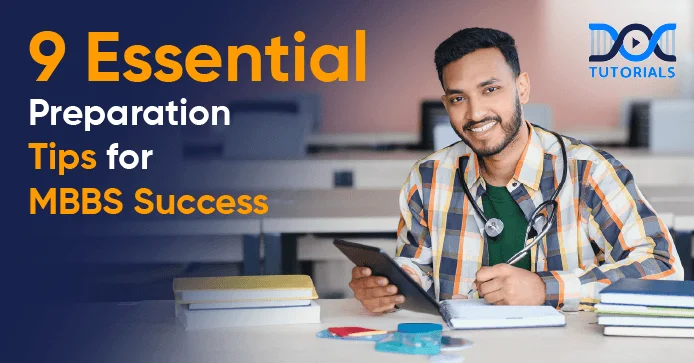MBBS First Year: Semester-Wise Subjects and Suggested Books

The first year of MBBS is crucial, as it lays the foundation for medical students to gain a deeper understanding of medical subjects as they progress to subsequent years. First year MBBS subjects include 3 main categories: Anatomy, Physiology, and Biochemistry, which are again subdivided into several other essential topics . Alongside the subjects, there is a set of recommended MBBS first-year books that will be helpful for students preparing for the medical exam. Keep reading to explore the various subjects of first-year MBBS and recommended books that will help prepare students for their first semester.
Subjects in MBBS First Year: Detailed Guide
Go through the following section to have a detailed overview of the MBBS first-year subjects, which include the essential topics under each subject:
- Anatomy: Human Body Structure
Anatomy explores the structure of the human body, where students get the opportunity to learn about the intricacies of gross anatomy, microanatomy, neuroanatomy, embryology, and genetics, with the help of cadaver dissection and advanced imaging techniques.
Having a good understanding of anatomy helps future clinicians to practice correctly. It is divided into several sub-branches that help students to have a better understanding of the subject:
- Microanatomy: Microanatomy is the study of microscopic structures of the human body, mainly the cells and tissues, which are not visible to the naked eye.
- Embryology and Genetics: Embryology in anatomy helps students understand the origin of the human body, while genetics explores how genetic information is inherited, encoded in DNA (deoxyribonucleic acid), and how any abnormality leads to congenital disabilities.
- Gross Anatomy: Gross anatomy is concerned with those structures of the human body that can be seen with the naked eye, such as the organs, muscles, and bones, allowing the students to have a proper idea of the human body.
- Neuroanatomy: Neuroanatomy deals with the structure of the nervous system, including the brain, spinal cord, and the associated nerves spread throughout the body.
- Physiology: Human Body Functions
Physiology explains the functioning of the human body. Students are introduced to the underlying mechanisms of bodily functions concerning the different systems, such as cellular functions, the cardiovascular system, the digestive system, the respiratory system, and the nervous system.
It helps the students to understand the functioning of the different organ systems of our body, separately as well as how well they coordinate with each other. The sub-branches include:
- Respiratory System: Studying the physiology of the respiratory system reveals the process of gaseous exchange through ventilation, diffusion, and pulmonary blood flow.
- General Physiology: General physiology is a broad concept comprising the basic principles and mechanisms that sustain human life, starting from the cellular level to the function of the whole human body.
- Neurophysiology: Neurophysiology deals with the functioning of the nervous system, comprising the process of electrical and electrochemical conduction of nerve impulses.
- Blood Physiology: The composition and function of blood in the body are explained in blood physiology, including essential functions such as oxygen transportation, clot formation, homeostasis, etc.
- Nerve-Muscle Coordination: Nerve-muscle coordination refers to the neuromuscular coordination, explaining the bodily processes responsible for smooth, controlled, and efficient body movements.
- Renal System: The physiology of the renal system focuses on the role of the kidney in maintaining homeostasis by several processes, such as filtering blood, excreting waste products, and ion exchange.
- Biochemistry: Biomolecular Composition and Functioning of the Human Body
Several chemical processes occur within our body to support human life, and the subject dealing with these chemical processes is biochemistry. This subject focuses on essential topics such as enzymes, biomolecules, and the metabolism of food products in our body, which eases the clinical practice of future doctors.
The following section lists the essential topics of biochemistry that form the foundation of the MBBS first year:
- Molecular Biology: Molecular biology deals with the structure and functions of the various molecules in the body’s biological processes, mainly the DNA, RNA, and proteins.
- Food Assimilation: Food assimilation explains the biochemical process of transporting the nutrients to the cells from the small intestine after complete digestion.
- Enzymes: Enzymes, also known as biological catalysts, accelerate the biochemical reactions occurring in our bodies and are classified under six sub-groups under biochemistry: oxidoreductases, transferases, hydrolases, lyases, ligases, and isomerases.
- Metabolic Pathways: Metabolic pathways in biochemistry explain the series of linked, enzyme-catalysed reactions, breaking down the complex molecules into simple ones, releasing energy.
- Hormones: It is the study of the synthesis, chemical nature, and mechanism of action of hormones that are known to regulate the physiological processes of the human body.
- Biomolecules: Essential molecules produced by the body that support human life are called biomolecules, which constitute a vast part of biochemistry in the first year of MBBS.
What Books are Recommended for the MBBS First Year?
The following table gives an overview of all the essential books that are recommended for subjects in the MBBS first year to have a better understanding:
| Subject | Sub-Topic | Name of the Book | Author |
| Anatomy | General Anatomy | Textbook of General Anatomy | BD Chaurasia |
| Textbook of General Anatomy | Shobha Rawlani | ||
| Textbook of General Anatomy | Vishram Singh | ||
| Textbook of General Anatomy | AK Datta | ||
| Gross Anatomy | Textbook of Gross Anatomy | Vishram Singh | |
| Textbook of Gross Anatomy | BD Chaurasia | ||
| Textbook of Gross Anatomy | Inderbir Singh | ||
| Textbook of Gross Anatomy | AK Datta | ||
| Histology | Textbook of Histology | Inderbir Singh | |
| Essentials of Human Histology | D R Singh | ||
| Embryology | Textbook of Embryology | Vishram Singh | |
| Textbook of Embryology | Inderbir Singh | ||
| Osteology | Textbook of Osteology | Poddar | |
| Dissection Manual | Romans G J Cunningham’s Practical Manual by Oxford publishers | Romans G J Cunningham | |
| Neuroanatomy | Textbook of Neuroanatomy | Vishram Singh | |
| Textbook of Neuroanatomy | Inderbir Singh | ||
| Genetics | Textbook of Genetics | Roopa Kulkarni | |
| Textbook of Genetics | SD Gangane | ||
| Surface and Radiological Anatomy | Textbook of Surface and Radiological Anatomy | A.Halim |
| Physiology Sub-Topic | Books | Author |
|---|---|---|
| Human Physiology | Human Physiology | C.C. Chatterjee |
| Textbook of Medical Physiology | G.K. Pal | |
| Textbook of Physiology | A.K. Jain | |
| Medical Physiology for Undergraduate Students | Indu Khurana | |
| Practical Manual | A Textbook of Practical Physiology | C.L. Ghai |
| Textbook of Practical Physiology | G.K. Pal |
| Subject | Sub-Topic | Name of the Book | Author |
| Biochemistry | Biochemistry | Textbook of Biochemistry | Rafi |
| Textbook of Biochemistry | Vasudevan | ||
| Textbook of Biochemistry | Satyanarayan | ||
| Practical Manual | Wilma Practical Biochemistry for MBBS | Wilma Delphine Silvia, Kulkarni Swetha, and Nimmy Maria James | |
| Laboratory Manual | Shivaraj Shankar |
How to Study for the MBBS First Year?
Studying for medical exams like MBBS includes rigorous academic activities and extensive courses, including never-ending assignments and examinations. Hence, students need to stay calm and study with maximum focus, for which some of the tips are mentioned in the following section:
- Developing Study Habits
MBBS is a vast course that might seem too complicated for new students. Hence, effective study habits reduce last-minute rush.
- Seeking Help When Required
When faced with difficulty, seeking help early can help students learn better and prevent academic mistakes, which pose a threat to the future of doctors.
- Focus on Practical Learning
Practical learning complements theoretical knowledge in medical science, which can be achieved by actively participating in labs and taking the initiative in various practical procedures.
- Stay Updated on Medical Advancements
As medical science is constantly evolving and updating, staying informed about new medical advancements will help students diagnose diseases more effectively. This can be done by attending workshops and reading medical journals.
FAQs about MBBS First Year Subjects
- How many subjects are there in the MBBS 1st Year?
The first year of MBBS introduces students to three main subjects: Anatomy, Physiology, and Biochemistry. These subjects cover the structure and function of the human body, as well as the chemical processes occurring within it.
- How many books are in the 1st year of MBBS?
The quantity of books in MBBS solely depends on the individual’s learning style, as one needs to refer to various books for additional knowledge due to the extensive nature of MBBS. However, the MBBS 1st year is divided into three main subjects, each subdivided into various essential topics.
- How difficult is the MBBS 1st year?
The difficulty level of the MBBS 1st year largely depends on the individual’s intelligence. However, anatomy is considered to be the most challenging subject in the first year owing to its huge volume and the need to remember the complex human body structures.
- How to prepare for MBBS 1st Year exams?
Some of the tips to prepare for the MBBS 1st year exams are:
- Be consistent
- Focus on concepts
- Use diagrams and flowcharts
- Engage in practical procedures
Conclusion
The MBBS first-year subjects lay the foundation for future doctors, with Anatomy, Physiology, and Biochemistry serving as the pillars. Choosing the correct books for studying, along with healthy habits, helps to comprehend the subjects more effortlessly.
As a reliable medical study partner, DocTutorials provides 3D animated lectures, Qbank, and previous year question papers in the MBBS curriculum.
Join DocTutorials today to excel in your medical exam with our in-depth MBBS course!
Latest Blogs
-

9 Essential MBBS Preparation Tips for Success
Achieving the dream of becoming a doctor is not easy. You need to be determined and have the right mindset…




